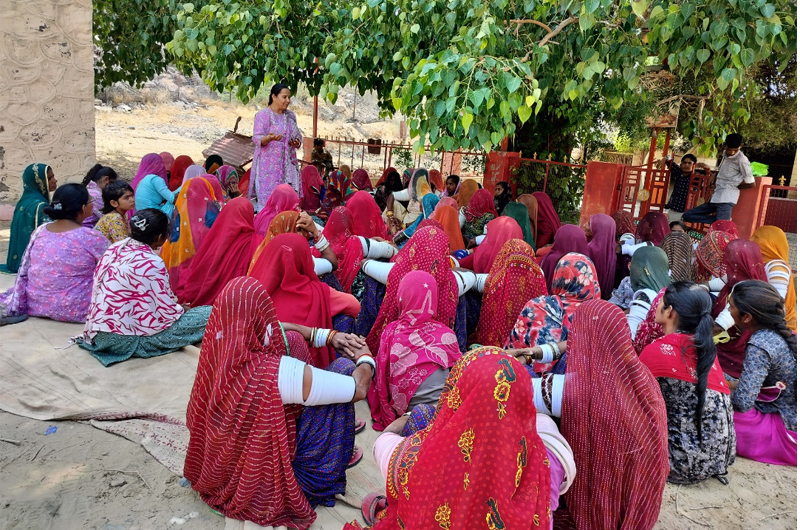When tradition outweighs laws, it is often incumbent on the people themselves to bring about the change they want to see. Bharat Dogra writes about a collective effort in Rajasthan’s Barmer District to make life easier for marginalised widows
The discrimination faced by widows is a dark side of rural society in India that often goes unremarked. Although the law gives these women equal social rights and any discrimination against them is illegal in theory, the weight of tradition goes against them in practice. Widows in many villages are frowned upon if they wear vibrant, colourful clothes, particularly in shades of red or pink, and rather than challenge the injustice of this and invoke the ire of family and community, the women just accept the ‘norm’.
In rural India, women are often married off at a younger age than their urban counterparts, and the number of relatively young widows is high – the strictures on colour choices are particularly hard on these younger women. While the curbs on dress, an outward symbol of widowhood, are hard enough, the women are also discouraged from attending many social ceremonies, as their presence is not considered auspicious. The cumulative burden of these restrictions can be overwhelming.

The Mahila Sangathan or Women’s Organisation in Barmer District of Rajasthan has been carrying out a campaign to change such discriminatory traditions. The region is a part of the Thar Desert where dwellings are scattered and hence chances of daily interactions with neighbours are low. When such a sense of isolation is combined with the weight of discrimination, the situation can become even more distressing.
The Sangathan has been organising meetings to emphasise the importance of according equal status to widows, not only in terms of law but also in terms of daily life at the village and family level. As women at various meetings started discussing the issue, many realised that they, perhaps unwittingly bowing to tradition, may be encouraging this discrimination, and became aware of the need to take deliberate steps to ensure equality for widows in real-life situations.
From the discussions, an idea was born – they could publicly drape widows in colourful chunris or stoles, thus sending a symbolic message espousing social change in the whole community. It turned into a small ceremony, called chunri paravirtan (change of chunri), which has been widely appreciated by women. There is much enthusiasm for such meetings now. About 115 widows have been draped at chunri paravirtans so far, and the campaign is continuing.
At a recent such meeting in Gamrakh Dham, Anita Soni, coordinator of Mahila Sangathan, said legal and constitutional rights become meaningful for victims of discrimination only when efforts to change real-life situations are made. Karishma Makariya, a social activist, said no stigma should be attached to the presence of widows at social events and ceremonies – a message conveyed by the chunri parivartan ceremonies.

In fact, such efforts should be made in other fronts too – widows should be able to protect their rights to land and livelihood whenever these are threatened. In some other villages, this writer noticed that widows were helpless in the face of powerful persons who wanted to grab their lands. Timely help in such difficult situations would be very meaningful, especially if the widows are left to bring up young children.
While the Indian Government has a pension scheme for widows, the amount is generally too small, even after state governments add their share to it. The amount should be raised, and steps taken to ensure that the money reaches all needy widows. In the more remote villages in particular, such as those in the desert areas of Rajasthan, widows often need the help of officials or voluntary organisations to access benefits of schemes, and such assistance should also be made available to them.
(The writer is a senior freelance journalist and author who has been associated with several social movements and initiatives. He lives in New Delhi.)



 from Webdoux
from Webdoux